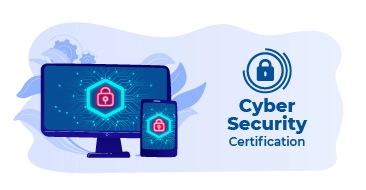 Jon Baleva
Jan 30, 2025
Jon Baleva
Jan 30, 2025

Cybersecurity certifications like CISSP, CompTIA Security+, Certified Ethical Hacker, CISA and CISM are considered the best certifications to boost your career in a world of sophisticated Cyberattacks. The List goes on…..
With cyberattacks becoming more sophisticated every day, Cybersecurity certifications are no longer just a "nice-to-have" but a "must-have". Most employers prefer certified cybersecurity professionals. Certifications can validate whether you have the latest skills and techniques to safeguard your organisation. According to Cybercrime Magazine “having a technology certification made it 38 percent more likely that a candidate would be hired, compared to a similarly-qualified candidate without that certification”. All the more reason for you to get your hands on a cybersecurity certification!
The cybersecurity certification landscape is broad, ranging from general to vendor-specific (like Microsoft, Google, Cisco, and CompTIA), and spanning entry-level to advanced credentials. It can be confusing as to which certification to choose. To help you join the cybersecurity workforce, here’s a list of the top 10 cybersecurity certifications, their corresponding certification exams, potential job roles after certification, and the average salaries.
With Cyber threats at an all-time high, organisations are in constant search for certified cybersecurity professionals. For instance, the recent Edoxi study report revealed that Cybersecurity jobs in the Middle East are projected to increase by 90% by 2025.
To position yourself for success in this thriving job market, obtaining the right certifications is crucial. The following are the top 10 cybersecurity certifications to help you boost your career;
Let’s take a brief look at each cybersecurity certification.
The CISSP certification, offered by (ISC)², is a globally recognised credential in the information security market. CISSP validates an information security professional’s technical and managerial knowledge and experience to effectively design, engineer, and manage the overall security posture of an organisation.
The CISSP exam uses Computerized Adaptive Testing (CAT) for all English exams. CISSP exams in all other languages are administered as linear, fixed-form exams.
Here are a few job roles that you can consider pursuing after getting your CISSP certification;
The Certified Ethical Hacker (CEH) certification, provided by the EC-Council is a globally recognised credential in the cybersecurity field. Certified Ethical Hacker (CEH) focuses on penetration testing and ethical hacking. The CEH training is ideal for beginners who want to break into the Cybersecurity workforce.
According to the survey conducted by the EC-Council ‘certified ethical hackers had a job placement rate of over 80%, with many landing roles in prestigious firms like IBM, Microsoft, and Deloitte’. The EC Council recently released the Certified Ethical Hacker v13 Certification, which is the world’s first ethical hacking program powered by AI. So if you are in doubt about how to become a cybersecurity professional, then CEH is the best entry-level cybersecurity certification available on the market now!
The CEH v13 certification exam tests knowledge on how to leverage AI for threat detection and rapid response to cyber incidents. To obtain your CEH certification, you need to pass the Knowledge exam. The CEH knowledge exam is a 4-hour test covering topics like Information security threats and attack vectors, Attack detention, Attack prevention, procedures and methodologies. There is also a 6-hour practical exam that is optional but will reward you with a higher level of CEH certification. Start honing your ethical hacking skills and become a job-ready cybersecurity professional!
CEH certification often leads to roles such as Penetration Tester or Security Analyst, and salaries can rise by 15% to 25% according to Global Knowledge.
CompTIA Security+ is an entry-level certification that establishes foundational knowledge in cybersecurity. Security+ is also the most widely adopted ISO/ANSI-accredited early career cybersecurity certification on the market. It covers essential topics such as network security and risk management. As organisations increasingly prioritise cybersecurity, this certification remains critical for new entrants into the field. As the best entry-level cybersecurity certification, CompTIA Security+ can help you break into the cybersecurity workforce.
The new CompTIA Security+ (SY0-701) is a 90-minute certification exam and covers the most in-demand skills in cybersecurity related to automation, zero trust, IoT, risk - and more. The CompTIA Security+ exam assesses understanding of various security concepts and practices. Candidates are recommended to have at least two years of experience in IT administration with a security focus before taking the exam.
Here are some cybersecurity job roles you can pursue after getting your CompTIA Security+ certification:
Professionals with CompTIA Security+ certification earn an average salary of about $75,000 per year.
Certified Information Systems Auditor® (CISA®) is world-renowned as the standard of achievement for auditing, monitoring, and assessing IT and business systems, and also acknowledges the importance of emerging technologies. The CISA certification is offered by ISACA. It is crucial for professionals involved in managing audit processes and ensuring compliance with regulations. The demand for CISA-certified professionals has increased due to the growing emphasis on governance and risk management.
The CISA certification showcases your expertise and asserts your ability to apply a risk-based approach to audit engagements. The CISA Training exam covers five domains related to information system auditing, including Governance and Management of IT and Protection of Information Assets. Candidates must have at least five years of professional experience in information systems auditing or control.
Here are some cybersecurity job roles you can pursue after getting your CISA certification:
CISA-certified professionals earn an average salary of approximately $115,000 per year. However, the salary of a CISA-certified professional can vary depending on the years of experience, industry and region.
The CISM certification from ISACA is designed for management-focused professionals who want to demonstrate their expertise in information security management. It emphasizes risk management and incident response strategies. With increasing cyber threats, this certification has become vital for organizational leadership roles in cybersecurity. CISM is a vital position in the IT sector, and hence there is a massive demand in the job market. If you want to become a certified information security manager, then start your preparations right away!
The CISM exam tests knowledge across four domains: Information Security Governance, Incident Management, Risk Management, and Program Development. Candidates need at least five years of work experience in information security management.
Here are some cybersecurity job roles you can pursue after getting your CISM certification:
CompTIA PenTest+ focuses on penetration testing skills and methodologies. It is essential for professionals involved in assessing security vulnerabilities through simulated attacks. As organizations seek proactive measures against cyber threats, this certification is gaining traction among security teams. If you are looking for a certification focused on security, CompTIA Pentest+ is the one for you!
The CompTIA Pentest + Certification Exam evaluates candidates' skills in planning and conducting penetration tests as well as analyzing results. It includes both multiple-choice questions and performance-based items.
Here are some cybersecurity job roles you can pursue after getting your CompTIA Pentest+ certification:
Professionals with CompTIA PenTest+ earn an average salary of about $95,000 per year.
GSEC certification from the Global Information Assurance Certification (GIAC) validates knowledge of information security concepts beyond basic skills. It is important for those looking to establish credibility in the field of cybersecurity. As cyber threats become more sophisticated, GSEC-certified professionals are increasingly sought after by employers.
The GSEC exam covers various topics related to information security principles and practices. Candidates are expected to demonstrate practical knowledge applicable to real-world scenarios.
Here are some cybersecurity job roles you can pursue after getting your GSEC certification:
CCSP certification from (ISC)² focuses on cloud security architecture, governance, risk management, and compliance. With the widespread adoption of cloud services, this certification has become vital for ensuring secure cloud environments. Studies show that organizations increasingly prioritize cloud security expertise among their staff. To become a sought-after cloud security professional, get your CCSP Training today!
The CCSP exam assesses knowledge across six domains related to cloud security design and implementation. Candidates should have at least five years of IT experience with three years specifically in information security and one year in cloud computing.
Here are a few job roles that you can pursue after getting CCSP certified;
CCSP-certified professionals can expect an average salary of approximately $125,000 per year, reflecting the high demand for cloud security skills.
CASP+ is an advanced-level certification that validates enterprise security skills at a managerial level. It emphasizes risk management and enterprise-level security solutions. As organizations face complex cybersecurity challenges, CASP+ helps professionals demonstrate their ability to lead security initiatives effectively.
Here are a few job roles that you can pursue after getting CASP+ certified;
The CASP+ exam assesses advanced knowledge across multiple domains including risk management and enterprise security architecture. Candidates should have at least ten years of IT administration experience with a focus on security.
CASP+-certified professionals earn an average salary of around $115,000 annually, reflecting their advanced skill set.
OSCP is a hands-on penetration testing certification offered by Offensive Security that emphasizes practical skills through real-world scenarios. This certification is critical for those seeking roles in offensive security or penetration testing due to its rigorous nature and focus on practical application rather than theoretical knowledge. OSCP Training will help you get into well-respected foundational certification for pen-testing jobs.
The OSCP exam consists of a 24-hour practical test where candidates must exploit vulnerabilities in various systems within a controlled environment. The OffSec Certified Professional+ (OSCP+) exam assesses your penetration testing skills. You’ll demonstrate your ability to identify, exploit, and report vulnerabilities in live systems within a lab environment. Following the exam, you have an additional 24 hours to submit a comprehensive penetration testing report.
Here are a few job roles that you can pursue after getting your OSCP Certification;
OSCP-certified professionals can expect an average salary of around $100,000 per year, reflecting the high demand for skilled penetration testers’
Cybersecurity is a promising and future-proof career path, fueled by an increasing demand for skilled professionals amid rising cyber threats. According to Statista, By 2025, the cybersecurity sector is projected to grow by 20%, with an estimated 4 million jobs available globally, reflecting a robust job market with an unemployment rate below 1%. Opportunities abound in various roles, such as Threat Hunters, Red Teamers, Digital Forensics Analysts, and Chief Information Security Officers (CISOs).
The median salary for cybersecurity professionals is around $81,000, with potential for higher earnings based on expertise. As businesses prioritise digital security, pursuing a career in this field not only offers job security but also continuous learning and advancement opportunities, making it an attractive option for those looking to build a resilient career.
Whether you’re just starting or upskilling for a cybersecurity career change or a seasoned pro, there’s a certification that’s perfect for you!

SENIOR TRAINER: NETWORKING AND PROGRAMMING
Jon Baleva is an IT professional with 20 years of experience in programming and networking. He is an expert in Python & IT Security domains as well as in Operating Systems (OS). He has trained professionals and students in IT Programming courses, Microsoft Azure, Linux & MAC OS. He is also a writer who writes on tech-related topics for various tech magazines in Philippine. He is now an IT Trainer with Edoxi Training Institute, Dubai.